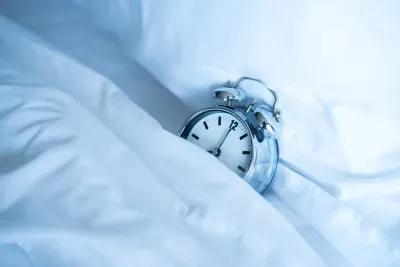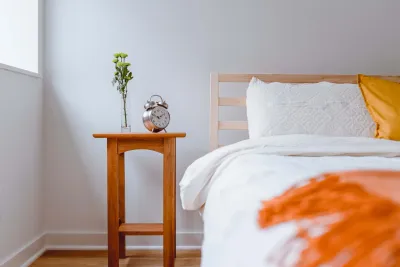The Advantages of Maintaining a Consistent Sleep Schedule
Ana Marie Schick: Resident Sleep Expert and Certified Health Coach • Jun 24, 2024

Key Takeaways
A consistent sleep schedule keeps your internal clock aligned, making sleep easier, mornings smoother, and days more productive.
- Going to bed and waking up at the same time trains your circadian rhythm, helping you fall asleep faster and wake up with less grogginess.
- Regular sleep timing supports steadier energy, better focus, and more balanced mood throughout the day.
- Consistent, high-quality sleep plays a role in immune health, hormone balance, and long-term heart health.
- A stable sleep routine improves memory, decision-making, and overall daytime performance.
Going to bed at the same time each night and waking up at the same time each morning may sound, well, boring. However, keeping an unchanging sleep schedule offers numerous health benefits you probably don’t want to miss.
A consistent sleep routine aligns with the body's internal clock, assisting with productivity and overall feelings of well-being. And by the way, that regular sleep schedule includes weekends and holidays (commence groans here)!
Hopefully, this article will give you enough positive information to want to stick to that schedule.
How to Stick to a Consistent Sleep Schedule
Sticking to a sleep schedule is just like shaping any other habit, it takes time and effort. On average, a habit takes about 66 days to form. Keep this in mind when trying and sticking to anything new.
It all takes commitment and work, but then the most important things in life do. And getting into the habit of a sleep schedule? Never underestimate how important of action this can be to your overall well-being.
The bottom line? When it comes to sleeping, your body craves consistency. Your brain and body work best when on a set routine. A sleep schedule helps synchronize your circadian rhythm, leading to better sleep quality and overall health.
According to Everyday Health magazine, your brain releases hormones that make you sleepy and awake at certain times. [1]
The more you stick to a regular schedule, the stronger those sleep and wake signals get (meaning, you spend less time trying to fall asleep or tossing and turning).
It's Time to Improve Your Sleep Quality
Get deeper, more restorative sleep with our cooling mattress toppers. With our Chilipad Dock Pro, you can adjust your bed temperature for more restful sleep ranging from 55- 115ºF.
Health Benefits of a Sleep Schedule
Just as exercise and nutrition are paramount to a healthy lifestyle, so is keeping to a sleep schedule.
Sleep Study: A recent study has concluded that maintaining a consistent sleep schedule is more important than getting more sleep. [2]
Below are some of the many benefits people who stuck with a sleep schedule achieve:
- They were more likely to maintain a healthy weight.
- They got sick less often.
- They decreased their risk for serious health issues like diabetes and heart disease.
- They had lower overall levels of stress and improved mood.
- They were more focused with fewer issues of brain fog.
- They got along better with most people. [3]
A consistent sleep schedule can boost physical health by improving immune function and aiding muscle recovery. Additionally, maintaining it can enhance sleep quality, leading to better overall health.
Best Sleep Schedule for Health
According to the Mayo Clinic, sticking to a schedule, including establishing a fixed wake up time, is the best way to ensure proper rest. [4] The recommended number for an adult is typically between 7 and 8 hours of sleep.
Anything more or less usually doesn’t allow a person to feel rested.

The Importance of Sleep
Sleep is one of the four pillars of health—right up there with exercise, nutrition, and relaxation. Without it, we can’t think clearly, perform our best, or feel restored.
Sticking to a consistent sleep schedule trains your body’s internal clock, making it easier to fall asleep, stay asleep, and wake up refreshed.
Read more about why sleep is so important.
How to Fix Your Sleep Schedule
Most people don’t think they can keep a sleep schedule, or the one they typically use is somehow “broken” and doesn't allow them to get restful, quality sleep. Some people have a difficult time actually starting a schedule.
Make sure to read our blog that mentions some simple sleep tips to fix your sleep schedule and improve the quality of your sleep.
What to Do If Nothing Works
In rare instances, a sleep disorder could be why no sleep schedule will work for you.
A disrupted sleep schedule can lead to various health issues, including chronic fatigue, mood swings, decreased productivity, and impaired cognitive function.
If you believe you may suffer from one, we recommend you seek the advice of a medical professional.
Sleep deprivation can result from a disrupted sleep schedule and has a negative impact on health. Having good sleep habits can help fix a disrupted schedule for sleep.
They are recognized as a disturbance to sleep that happens on a regular basis. [5]
Some of the more common signs and symptoms are:
- Trouble falling or staying asleep.
- Still tired after a good night’s sleep.
- Sleepiness in the daytime makes it difficult to accomplish your normal day-to-day activities.
- Loud snoring.
- Gasping or pausing in breathing while sleeping.
- An extreme level of difficulty in moving when you first wake up time. [6]
Sleep phase syndrome can affect sleep patterns and may require professional intervention.
Final Thought
At the end of the night (literally), the biggest win from sticking to a regular sleep schedule is better health, sharper focus, and smoother mornings. When your sleep and wake times are consistent, your internal clock—aka your circadian rhythm—knows exactly when to power down and when to reboot.
That means falling asleep faster, staying asleep longer, and waking up feeling refreshed instead of reaching for a triple espresso.
Tip: Practicing good sleep habits can help improve your sleeping patterns.
And hey, your schedule doesn’t have to be perfect—even making a few simple adjustments to your bedtime routine, like dimming the lights, putting down the phone, or cooling the room, can make a big impact.
Still struggling? A sleep medicine specialist can help spot patterns, diagnose disorders, and recommend treatments that actually work for your unique sleep style.
Frequently Asked Questions About Consistent Sleep Schedules
Why Is Maintaining A Consistent Sleep Schedule Important?
Keeping a regular sleep schedule strengthens your circadian rhythm, making it easier to fall asleep, stay asleep, and wake up energized without feeling like a zombie.
How Quickly Can A Regular Sleep Schedule Improve My Health?
Benefits can show up in just a few days to a few weeks for some people, including better mood, sharper focus, higher energy, and even a stronger immune system. Sleep is basically your secret power-up.
What Happens If I Constantly Change My Sleep Schedule?
Frequent changes confuse your internal clock, leading to sleep deprivation, mood swings, memory issues, and even a higher risk for chronic health problems. Your body loves predictability—even if your calendar does not.
What Are The Top Benefits Of A Consistent Sleep Schedule?
You unlock a whole toolbox of wellness upgrades:
- Improved sleep quality and duration
- Better concentration and decision-making
- Boosted mood and emotional regulation
- Stronger immune system
- More stable energy levels throughout the day
Peer-Reviewed Research References
-
DiGiulio, S., & Chua, J. P., MD, PhD.
Healthy Sleep: Why You Need Sleep, How Much You Need, and How to Get More.
Everyday Health, 2022.
Study Type: Health & Wellness Editorial Resource
Key Finding: Adequate, high-quality sleep is essential for physical health, cognitive performance, emotional regulation, and long-term disease prevention, with consistent routines and sleep hygiene playing a central role.
View Resource
Source URL: https://www.everydayhealth.com/sleep-disorders/sleep/sleep-101-ultimate-guide-on-how-get-better-nights-sleep/
-
Windred, D. P., et al.
Sleep Regularity Is a Stronger Predictor of Mortality Risk than Sleep Duration.
SLEEP, 2023.
Study Type: Prospective Cohort Study
Key Finding: Consistent sleep timing was more strongly associated with lower mortality risk than total sleep duration alone, emphasizing the importance of regular sleep schedules for long-term health.
View Study
Source URL: https://academic.oup.com/sleep/article/47/1/zsad253/7280269
-
Brown, M.
Get Enough Sleep.
MyHealthfinder, 2022.
Study Type: Government-Backed Health Education Resource
Key Finding: Getting enough sleep supports heart health, immune function, mental well-being, and injury prevention, with recommended sleep durations varying by age and lifestyle factors.
-
Mayo Clinic.
6 Steps to Better Sleep.
Mayo Clinic, 2020.
Study Type: Clinical Health Guidance Resource
Key Finding: Practical strategies—such as maintaining a consistent sleep schedule, optimizing the sleep environment, and limiting stimulants—can significantly improve sleep quality and duration.
View Resource
Source URL: https://www.mayoclinic.org/healthy-lifestyle/adult-health/in-depth/sleep/art-20048379
-
Johns Hopkins Medicine.
Regular Exercise for Better Sleep.
Johns Hopkins Medicine, 2019.
Study Type: Medical & Wellness Education Resource
Key Finding: Regular physical activity helps regulate circadian rhythm, reduce stress, and improve sleep onset and depth, especially when exercise is performed earlier in the day.
View Resource
Source URL: https://www.hopkinsmedicine.org/health/wellness-and-prevention/exercising-for-better-sleep
-
Centers for Disease Control and Prevention (CDC).
Sleep and Sleep Disorders.
CDC, 2019.
Study Type: Government Public Health Resource
Key Finding: Insufficient sleep is a widespread public health concern linked to chronic conditions such as obesity, diabetes, cardiovascular disease, and depression, highlighting the need for population-level sleep education.
View Resource
Source URL: https://www.cdc.gov/sleep/index.html









